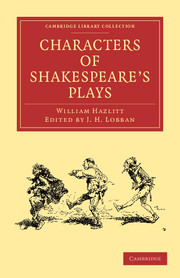Book contents
- Frontmatter
- Preface
- Contents
- Introduction
- Preface
- Cymbeline
- Macbeth
- Julius Cæsar
- Othello
- Timon of Athens
- Coriolanus
- Troilus and Cressida
- Antony and Cleopatra
- Hamlet
- The Tempest
- The Midsummer Night's Dream
- Romeo and Juliet
- Lear
- Richard II
- Henry IV
- Henry V
- Henry VI
- Richard III
- Henry VIII
- King John
- Twelfth Night; or, what you will
- The Two Gentlemen of Verona
- The Merchant of Venice
- The Winter's Tale
- All's Well That Ends Well
- Love's Labour's Lost
- Much Ado About Nothing
- As You Like It
- The Taming of the Shrew
- Measure for Measure
- The Merry Wives of Windsor
- The Comedy of Errors
- Doubtful plays of Shakespear
- Poems and Sonnets
- Notes
Romeo and Juliet
Published online by Cambridge University Press: 07 September 2010
- Frontmatter
- Preface
- Contents
- Introduction
- Preface
- Cymbeline
- Macbeth
- Julius Cæsar
- Othello
- Timon of Athens
- Coriolanus
- Troilus and Cressida
- Antony and Cleopatra
- Hamlet
- The Tempest
- The Midsummer Night's Dream
- Romeo and Juliet
- Lear
- Richard II
- Henry IV
- Henry V
- Henry VI
- Richard III
- Henry VIII
- King John
- Twelfth Night; or, what you will
- The Two Gentlemen of Verona
- The Merchant of Venice
- The Winter's Tale
- All's Well That Ends Well
- Love's Labour's Lost
- Much Ado About Nothing
- As You Like It
- The Taming of the Shrew
- Measure for Measure
- The Merry Wives of Windsor
- The Comedy of Errors
- Doubtful plays of Shakespear
- Poems and Sonnets
- Notes
Summary
Romeo and Juliet is the only tragedy which Shakespear has written entirely on a love-story. It is supposed to have been his first play, and it deserves to stand in that proud rank. There is the buoyant spirit of youth in every line, in the rapturous intoxication of hope, and in the bitterness of despair. It has been said of Romeo and Juliet by a great critic, that “whatever is most intoxicating in the odour of a southern spring, languishing in the song of the nightingale, or voluptuous in the first opening of the rose, is to be found in this poem.” The description is true; and yet it does not answer to our idea of the play. For if it has the sweetness of the rose, it has its freshness too; if it has the languor of the nightingale's song, it has also its giddy transport; if it has the softness of a southern spring, it is as glowing and as bright. There is nothing of a sickly and sentimental cast. Romeo and Juliet are in love, but they are not love-sick. Everything speaks the very soul of pleasure, the high and healthy pulse of the passions: the heart beats, the blood circulates and mantles throughout.
- Type
- Chapter
- Information
- Characters of Shakespeare's Plays , pp. 106 - 118Publisher: Cambridge University PressPrint publication year: 2009First published in: 1908

